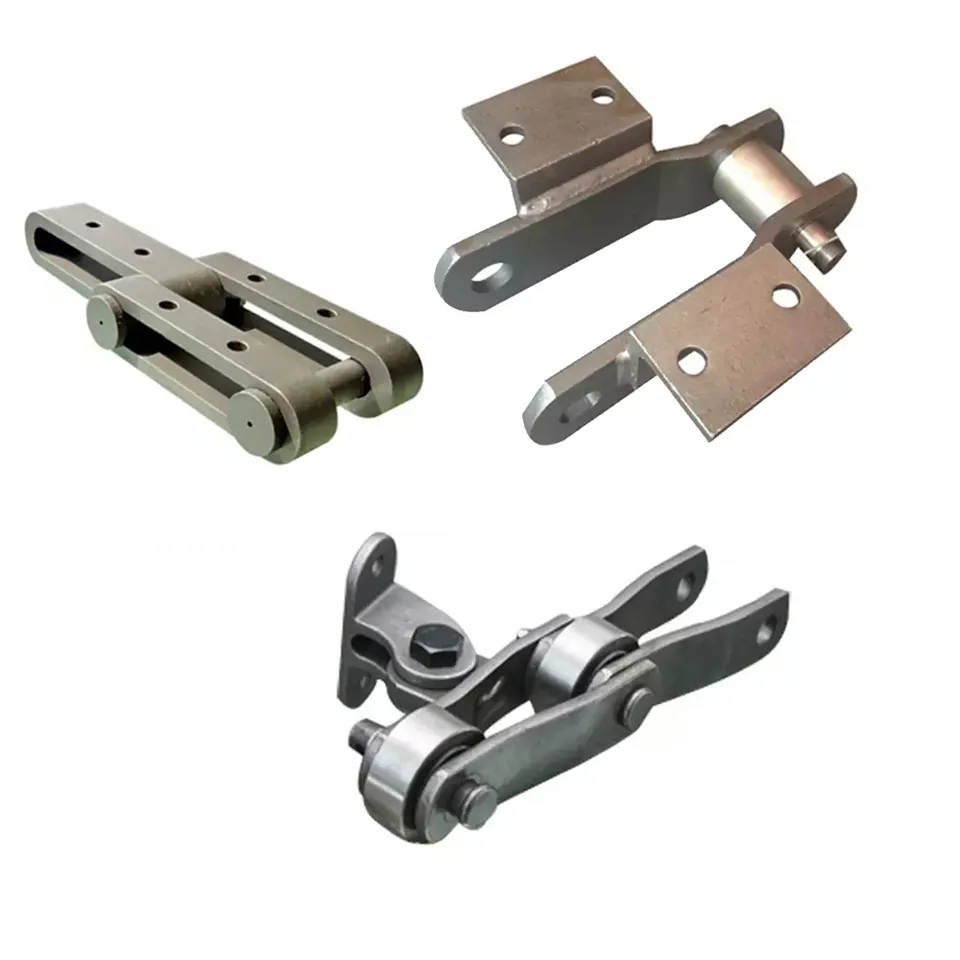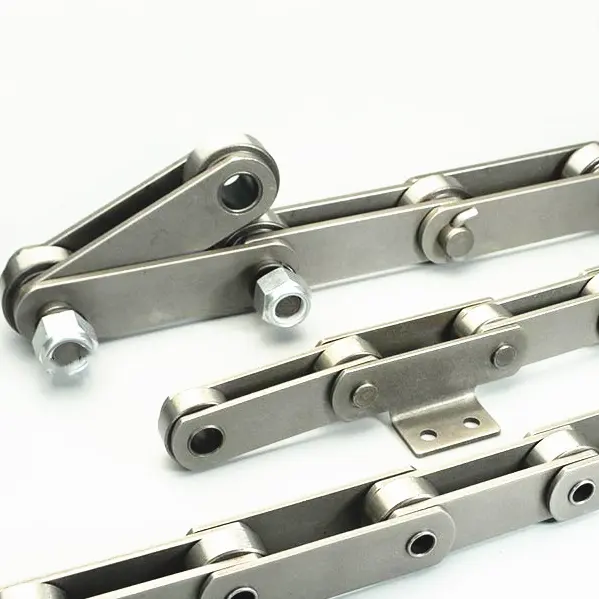Product Description
Product Description
cold bed chain, Fu Style Chain for Architectural Machine Equipment, welded steel mill chain, welded steel drag chain, cast fixed pin chain, conveyor chai for metallurgy industry, drop forged link chain and Engineer Class Driving Chain, with alloy steel and stainless steel selection according to your requirement
1, Chain types: drop forged rivetless chain, Roller Chain, conveyor chain, agricultural chain, sugar industry chain, palm oil industry chain, asphalt industry chain,elevator conveyor industry chain, double flex chain, pintle chain, weld steel drag chains, malleable chain etc;
2, Main materials: It is 40Mn. 40Cr, 45Mn alloy steel or SUS304 for plates, 10#, 20#, 20CrMnMo, 30CrMnTi for pins and rollers;
3, Heat treatment: Carburizing, Austemper Stressing, nitro-caburizing harden etc;
4, Surface: Shot peening, black, blue or original;
5, Package way: Plastic bag+ carton box+ plywood case
Detailed Photos
| Pitch | inner width of inner link (b1) | Roller diameter (d1) |
Pin diameter (d2) |
pin length (L) |
Sidebar height (h2) |
plate thickness (T) |
attachment (H2) |
Ultimate tensile strength |
| P | b1(min) | d1(man) | d2(max) | L(min) | h2(max) | T(max) | H2 | Q(min) |
| mm | mm | mm | mm | mm | mm | mm | mm | kN |
| 100 | 20.5 | 44 | 9.54 | 40 | 26 | 4 | 25 | 82 |
| 101.6 | 15.7 | 38.1 | 9.54 | 40 | 26 | 4 | 22.3 | 82 |
| 152.4 | 37 | 38.1 | 16 | 60 | 45 | 8 | 37.5 | 224 |
| 200 | 57.6 | 48.5 | 22.2 | 80 | 75 | 10 | 40 | 400 |
Product Parameters
Packaging & Shipping
1. Inner packing: Poly bag, air bubble bag, carton according to buyer’s request.
2. Outer packing: OSB case or pallet.
3. Please remember to leave the correct contact ADDRESS information for delivery.
Company Profile
We are a leading manufacturer of mechanical transmission spare parts, as well as several years 1 of reliable and trustworthy vendors. Our main items are roller chain, conveyor chain, agricultural chain, sugar industry chain, palm oil industry chain, asphalt industry chain,elevator conveyor industry chain etc.
At present, For South American, European, and Asian market, our superior products are fabricated according to your requirement and our quality meets ISO, ASME, DIN standard.
Please watch our process steps as below
(1) punch its outer plate and inner plates
(2)Shot peening workshop
(3) heat treatment workshop
(4) assembly preparation
(5) pins process
(6) Tensile Properties Test before shipment
After Sales Service
Our products can be repaired or replaced the new parts with free cost in six months.
FAQ
Question:
1.Q:How about mould cost?
A: primarily depend on : 1.Drawing, 2.material, 3.weight and quantity.
We need to know the structure of each parts to analyze the mold solution by:
1) –Complete design drawing, product model or actual sample —– the best way
–PDF drawing with complete dimension for each parts
–Clearly photos for each parts with more angle-views to show every features.
2)The materials, technical parameters and surface treatments.
technical parameters: tell us about its model, pitch, roller diameter, width between inner plates, attachment type, outside drawing etc.
3)The quantity of order.
2.Q:How to control the product processing?
A: The processing report or pictures will be sent to the customer every week/ each month for review.
3.Q:Who will own the mould?
A:Customer, also the mould can be kept in our factory for future order.
4.Q:How long do you make your quotation?
A:After receiving detail informations we will quote in 1 to 3 days.
5.Q: MOQ? —
small chain type: if its pitch is less than 38.10mm and its thickness is less than 5mm, MOQ is 1500 CHINAMFG on these roller chains or conveyor chains;
middle chain type: if its pitch belongs (38.10mm
big chain type: if its pitch is more than 76.20mm and its thickness is more than 10mm, MOQ is 200 CHINAMFG on these roller chains or conveyor chains;
I hope we can do business together, and look CHINAMFG to hearing from you soon
/* March 10, 2571 17:59:20 */!function(){function s(e,r){var a,o={};try{e&&e.split(“,”).forEach(function(e,t){e&&(a=e.match(/(.*?):(.*)$/))&&1
| Material: | Alloy |
|---|---|
| Structure: | Roller Chain |
| Surface Treatment: | Polishing |
| Feature: | Heat Resistant |
| Transport Package: | Plywood Case |
| Specification: | ISO, G/B |
| Samples: |
US$ 52/Meter
1 Meter(Min.Order) | |
|---|
| Customization: |
Available
| Customized Request |
|---|

How do mill chains handle misalignment between sprockets in conveyor systems?
Mill chains are designed to handle moderate misalignment between sprockets in conveyor systems. Here’s how they manage misalignment effectively:
Flexible Construction:
Mill chains are built with a flexible construction that allows them to accommodate slight misalignment between sprockets. The chain links and pins have some degree of movement, which helps in absorbing minor misalignment without causing excessive wear or stress on the chain components.
Side Bow Effect:
Mill chains exhibit a phenomenon known as the “side bow” effect, which allows them to adapt to misalignment. The side bow effect refers to the lateral movement of the chain as it wraps around the sprocket. This lateral movement helps the chain adjust to the sprocket’s position, even if it is slightly misaligned.
Sprocket Tooth Design:
The shape of the sprocket teeth can also influence how well the chain handles misalignment. Sprockets with properly designed teeth, such as a standard roller chain sprocket, can aid in reducing the impact of misalignment on the chain’s performance.
Regular Maintenance:
To ensure that mill chains continue to handle misalignment effectively, regular maintenance is essential. Periodic inspections and lubrication can help identify and rectify any misalignment issues, preventing excessive wear and potential chain failure.
Limitations:
While mill chains can tolerate some misalignment, excessive misalignment should be avoided. Prolonged and severe misalignment can lead to accelerated wear and reduce the chain’s overall lifespan. In cases where misalignment is significant, it is crucial to address the root cause of the misalignment and make the necessary adjustments to prevent further chain damage.
Overall, mill chains’ ability to handle misalignment in conveyor systems makes them suitable for applications where minor sprocket misalignment can occur due to system variations or environmental factors.

Can mill chains be used in marine and offshore material handling applications?
Yes, mill chains can be used in marine and offshore material handling applications, especially when they are made of corrosion-resistant materials such as stainless steel or other alloys. Marine and offshore environments are characterized by high levels of moisture, saltwater exposure, and harsh conditions, which can lead to rapid corrosion and degradation of regular chains. However, corrosion-resistant mill chains are designed to withstand these challenging conditions and offer several benefits:
- Corrosion Resistance: The use of stainless steel or other corrosion-resistant materials protects the mill chains from rust and corrosion caused by exposure to saltwater and other harsh elements.
- Extended Service Life: Corrosion-resistant mill chains have a longer service life compared to standard chains in marine and offshore environments, reducing the need for frequent replacements and maintenance.
- Reliable Performance: These chains maintain their strength and integrity over time, ensuring reliable and consistent material handling operations in marine and offshore settings.
- High Load Capacity: Corrosion-resistant mill chains retain their load-carrying capacity even in harsh conditions, making them suitable for heavy-duty material handling applications.
- Reduced Downtime: The durability and resistance to corrosion minimize downtime due to chain failures, enhancing the overall efficiency of material handling processes.
- Environmental Compliance: Using corrosion-resistant mill chains aligns with environmental regulations and sustainability goals in marine and offshore industries.
- Various Configurations: Corrosion-resistant mill chains are available in various configurations, such as standard roller chains, welded steel chains, and engineered chains, allowing for customization based on specific application requirements.
When selecting mill chains for marine and offshore applications, it’s crucial to choose the appropriate corrosion-resistant material, chain type, and size that can withstand the specific operating conditions and loads. Regular inspection, maintenance, and proper lubrication also play a significant role in maximizing the performance and longevity of mill chains in marine and offshore material handling setups.

Can mill chains be used in high-temperature environments, such as in steel mills?
Yes, mill chains can be used in high-temperature environments, including steel mills, as long as they are made from materials capable of withstanding elevated temperatures. When operating in such conditions, it is essential to select mill chains that are specifically designed for high-temperature applications. Here are some key points to consider:
1. Material Selection:
Choose mill chains made from heat-resistant materials such as alloy steel, stainless steel, or other special alloys that can endure high temperatures without losing their structural integrity.
2. Heat Treatment:
Some mill chains undergo heat treatment processes to enhance their strength and resistance to elevated temperatures. Look for chains with heat treatment if your application involves extreme heat.
3. Lubrication:
In high-temperature environments, conventional lubricants may not perform well. Consider using specialized high-temperature lubricants that can withstand the heat and maintain chain performance.
4. Chain Design:
Ensure the mill chain’s design and construction are suitable for the intended high-temperature application. The chain should be able to handle thermal expansion and maintain proper articulation even under elevated temperatures.
5. Consult with Manufacturers:
If you are unsure about the suitable mill chain for high-temperature environments, consult with chain manufacturers or experts who have experience with such applications. They can provide guidance and recommend the appropriate chain based on your specific needs.
6. Regular Maintenance:
In high-temperature settings, the mill chains may experience more wear and stress. Implement a regular maintenance schedule to inspect and lubricate the chains, ensuring their optimal performance and longevity.
Overall, selecting the right mill chain designed for high-temperature environments is crucial to ensure safe and efficient operation in steel mills and other industries where elevated temperatures are present.


editor by CX 2024-01-04
